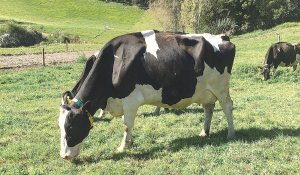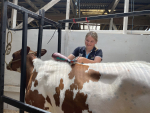Holstein Friesian NZ, and herd improvement co-operative LIC have launched a joint sire proving scheme that aims to select and prove Holstein Friesian bulls for New Zealand dairy farmers.
The scheme will use genomic screening to provide farmers with elite Holstein Friesian bulls for artificial breeding, whilst giving LIC an opportunity to tap into diverse cow families in Holstein Friesian NZ member herds for its breeding programme.
While the Discovery Project – another HFNZ/ LIC joint venture – requires high-BW heifer calves to populate the programme, the new Holstein Innovation project focuses on diversity: while bulls will still need to be of suitable genetic merit (BW), some compromise can be made.
Bull calves should be nominated as soon as they are born, and HFNZ and LIC will mutually agree which nominated bulls are to be genomically screened and later purchased, if successful, with up to five young bulls entering LIC’s Sire Proving Scheme (SPS) annually. Bulls have the potential to be marketed from one-year-old through to daughter proven, both domestically or internationally, and Holstein Friesian NZ will have the ability to sell semen to members in the bull’s first year of semen production.
Holstein Innovation will also include an accompanying female programme, which will see up to 200 nominated females genomically screened annually.
Mating of the nominated females will include the option to utilise LIC’s elite young sires, or daughter proven sires, at no cost. Resulting progeny – both heifers and bulls – will be genomically screened.
HFNZ Holstein Innovation Committee Chair Doug Courtman says Holstein Innovation will shine the light on bulls that are not traditionally sought after for marketing.
“It is an opportunity for breeders to put forward bulls that might not have otherwise been marketed,” Courtman says. “With LIC seeking alternative bloodlines, the Holstein Friesian breed’s genetic strength will only increase.
“The elite young Holstein Friesian bulls chosen will deliver increased diversity and faster rates of genetic gain on farm.”


















